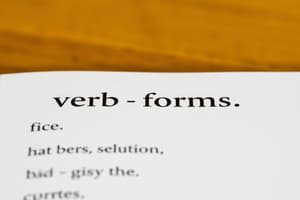Podcast
Questions and Answers
Which of the following is NOT a type of verb form discussed in the article?
Which of the following is NOT a type of verb form discussed in the article?
- Combinations with auxiliary verbs
- Finite verb forms
- Nonfinite forms
- Infinitive forms (correct)
What are the uses considered for verb forms in English?
What are the uses considered for verb forms in English?
- Tense, aspect, mood, modality, and voice (correct)
- Mood and modality only
- Tense and aspect only
- Voice and mood only
Which section of the article provides information about the grammatical structure of clauses?
Which section of the article provides information about the grammatical structure of clauses?
- Inflected forms of verbs
- Non-standard dialect forms
- English verbs
- English clause syntax (correct)
How many different inflected forms can a typical English verb have?
How many different inflected forms can a typical English verb have?
Where can readers find information about inflected forms of verbs in English?
Where can readers find information about inflected forms of verbs in English?
______ verb forms include: go, goes and went
______ verb forms include: go, goes and went
______ forms include: (to) go, going and gone
______ forms include: (to) go, going and gone
______ of verb forms with auxiliary verbs include: was going and would have gone
______ of verb forms with auxiliary verbs include: was going and would have gone
The base form or plain form of a verb is also known as the ______ form.
The base form or plain form of a verb is also known as the ______ form.
The base form of a verb can be used as an ______, imperative, present subjunctive, and present indicative.
The base form of a verb can be used as an ______, imperative, present subjunctive, and present indicative.
Inflected forms of verbs
Inflected forms of verbs
Finite verb forms such as go, goes and went
Finite verb forms such as go, goes and went
Nonfinite forms such as (to) go, going and gone
Nonfinite forms such as (to) go, going and gone
Combinations of such forms with auxiliary verbs, such as was going and would have gone
Combinations of such forms with auxiliary verbs, such as was going and would have gone
For details of how inflected forms of verbs are produced in English, see English verbs.
For details of how inflected forms of verbs are produced in English, see English verbs.
______ forms include: (to) go, going and gone
______ forms include: (to) go, going and gone
______ of verb forms with auxiliary verbs include: was going and would have gone
______ of verb forms with auxiliary verbs include: was going and would have gone
The base form or plain form of a verb is also known as the ______ form.
The base form or plain form of a verb is also known as the ______ form.
______ verb forms include: go, goes and went
______ verb forms include: go, goes and went
______ of verb forms with auxiliary verbs include: was going and would have gone
______ of verb forms with auxiliary verbs include: was going and would have gone
Which of the following is NOT a type of verb form discussed in the article? ______
Which of the following is NOT a type of verb form discussed in the article? ______
How many different inflected forms can a typical English verb have? ______
How many different inflected forms can a typical English verb have? ______
Where can readers find information about inflected forms of verbs in English? ______
Where can readers find information about inflected forms of verbs in English? ______
The baby___________(just/eat).
The baby___________(just/eat).
Flashcards are hidden until you start studying



